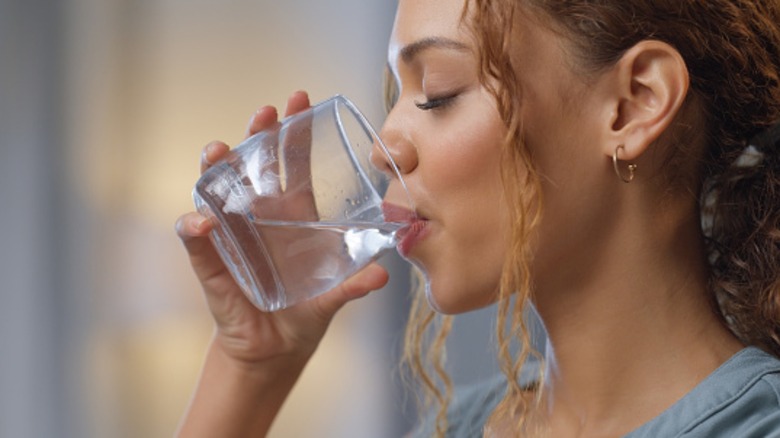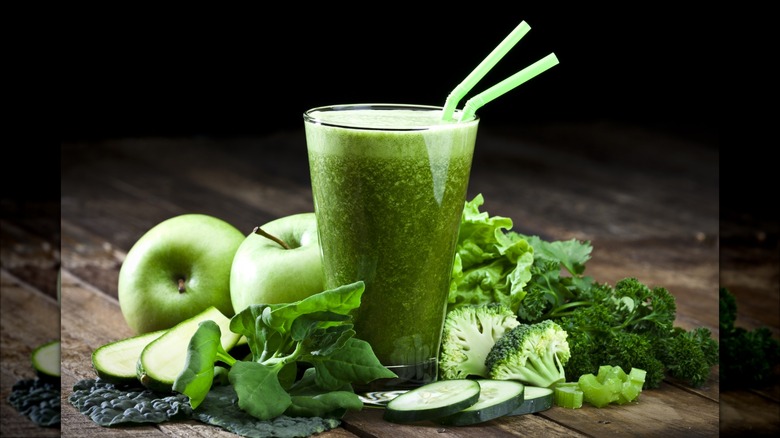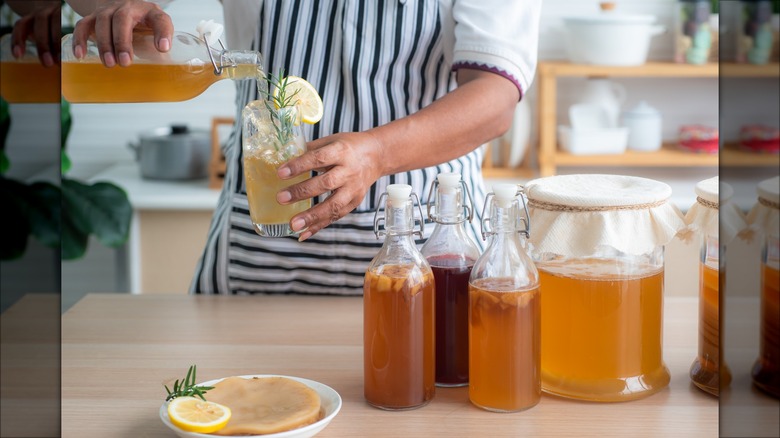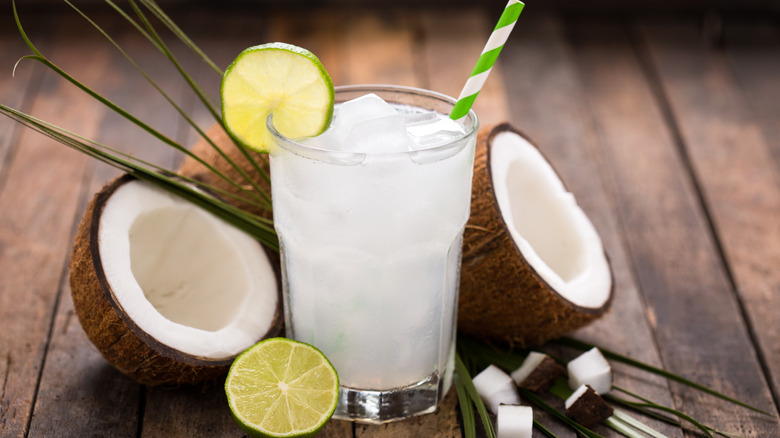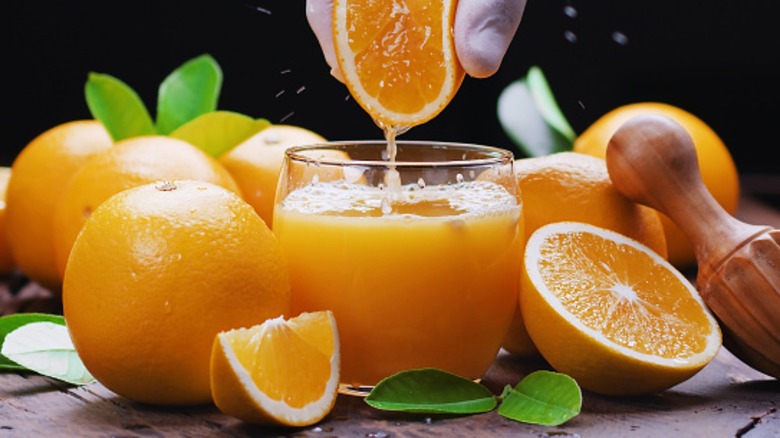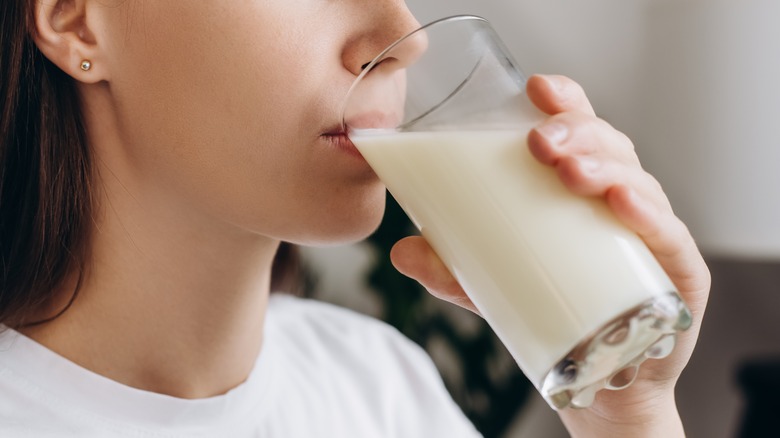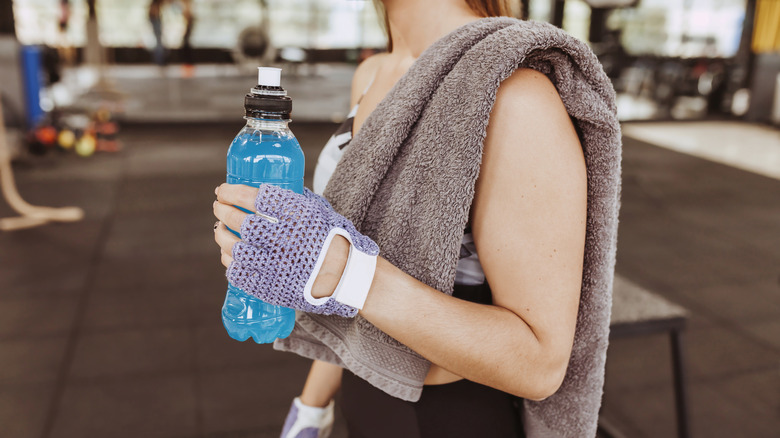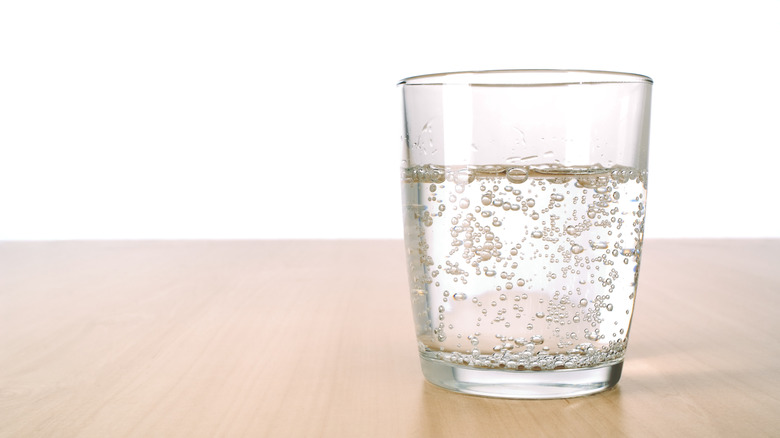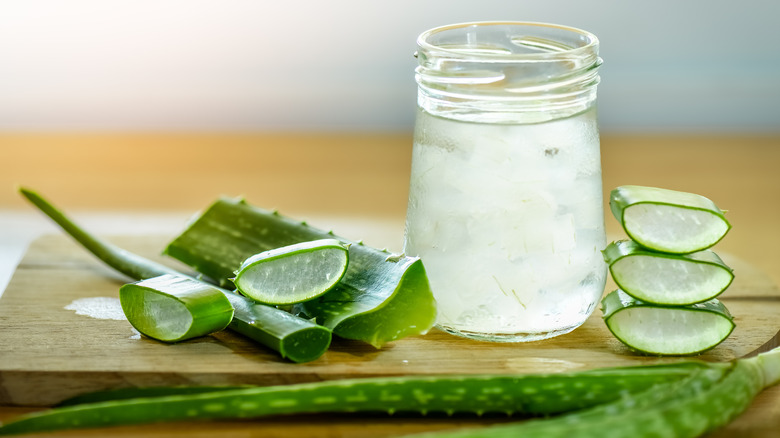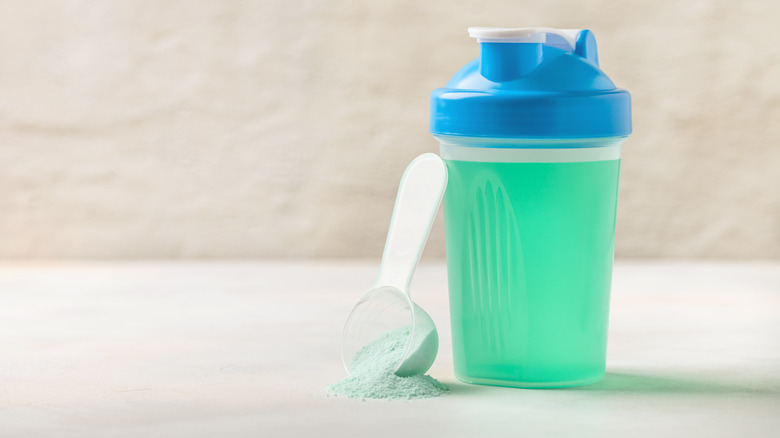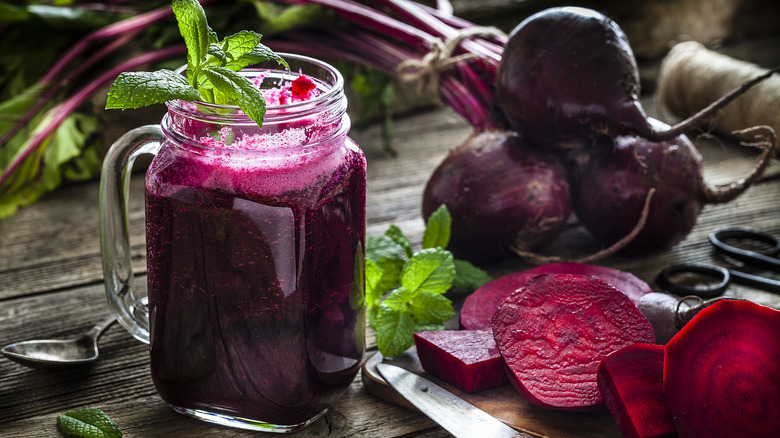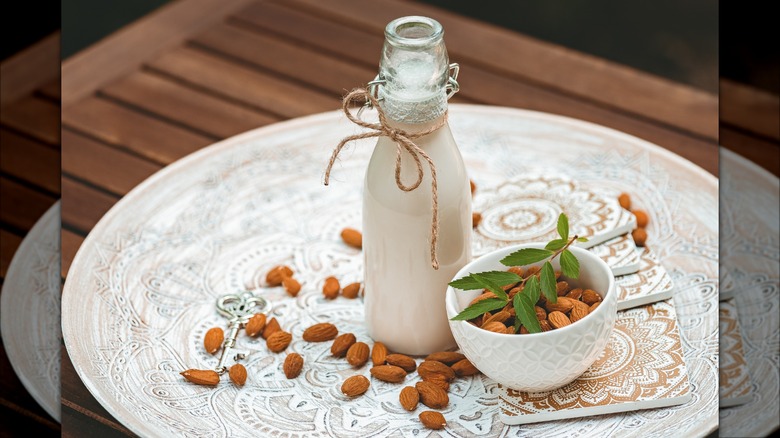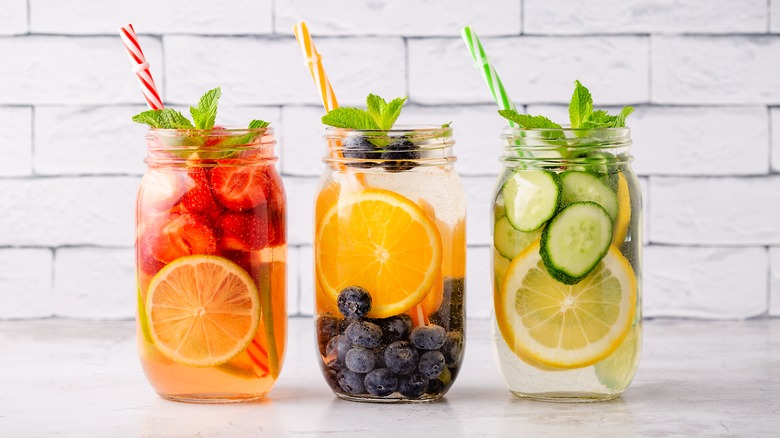12 Drinks That Might Keep You More Hydrated Than Water
Remaining well-hydrated is essential for maintaining overall health, from your mood and energy levels to your skin complexion and digestion. It's undeniable that water's simplicity makes it a common go-to for hydration, but let's be honest: It works, but it's plain. Some drinks bring an extra layer of hydration due to their unique compositions — this doesn't make them a perfect substitute for plain water, but they are certainly a tastier option that still does a lot of good for your body. They can also get the job done quickly and efficiently. Have you ever heard that the water you drink today actually helps you tomorrow? A prime example of this is when you wake with a headache — you're likely dehydrated from a lack of water the day before, according to Medical News Today. This is why it's so important to hydrate your body on a daily basis with various foods or drinks that have a high water content.
Natural fruit juices, fruit-infused water, and smoothies, for example, have a delicious flavor but also provide valuable hydration due to the amount of water in them. Likewise, plant-based waters and dairy alternatives like almond milk can hydrate your body while being lighter like water. Here, we'll delve into the many drinks that could keep you just as hydrated as water while still giving your body what it needs.
Green smoothies
Smoothies can be an excellent choice for staying hydrated, especially when they're made with natural ingredients, such as green smoothies that use less sugar and more — you guessed it – green or natural ingredients. As you consider smoothies for hydration, making them without added sugars is key because those sugars can contribute to dehydration, says Medical News Today. Instead, prioritize hydrating fruits, vegetables, and liquids that provide more water. This doesn't mean it can't be sweet at all. Although green vegetables don't have that sugary taste, natural sweetness from fruits can help add flavor without compromising too much of the hydration abilities.
Still, when preparing smoothies, the ingredients you choose are vital. For the healthiest and most hydrating smoothie, you should refrain from sugary foods and build your smoothie with natural, water- and fiber-rich vegetables and fruits. Leafy, green vegetables like spinach and kale, together with foods like cucumbers, avocado, celery, and watermelon, provide liquid and essential vitamins, minerals, and antioxidants.
If you're someone who dislikes vegetables or you aren't getting enough of them in your daily diet, this is an easy way to start consuming more — that goes for the kids, too! Vegetables disguised in a delicious smoothie are a perfect treat for picky eaters. Plus, if you find yourself in a rush and skipping breakfast, make-ahead green smoothies can save you a lot of time.
Kombucha
Kombucha is a bubbly beverage made of fermented tea. During the fermentation process, tea, sugar, and a symbiotic culture of bacteria and yeast are combined, resulting in a carbonated drink with little residual sugar. Although none of these ingredients particularly suggest an ultra-hydrating beverage, with water as a primary ingredient, kombucha is ideal for fluid intake. How hydrating it is depends on how it was made. Some brands rely on fruit juice after the fermentation to add flavor, plus the kind of tea used varies from batch to batch. The main downside to fruit juice-enhanced booch is the added sugars that would have otherwise broken down.
While the fizzy history of kombucha dates way back to 221 B.C., the drink has gained modern popularity largely because of its healthful nature. Tea (and the water in it) alone contributes to a lot of kombucha's positive qualities, but the fermentation can do wonders for your gut health with probiotics. It should, however, be consumed in moderation if not because of the caffeine and acid it contains, then perhaps because of the minute amount of alcohol that remains in each batch. There isn't much, but it shouldn't replace the water or hydrating foods in your diet. Rather, kombucha could be a beneficial component in your daily regimen alongside meals or snacks.
Coconut water
Maybe because it's a superfood or maybe because water is in the name, but it comes as little surprise that coconut water is optimal for hydration. In general, coconuts provide a substantial amount of minerals like magnesium, potassium, copper, and iron. They're also a smart source of dietary fiber and healthy fat. Coconut water, which tastes nutty while also having natural sweet and sour notes, is also beneficial for your body aside from keeping it hydrated. Between the healthy dose of potassium and sodium it offers, which act as electrolytes for your body, coconut water is also low in calories while being fat-free.
Health benefits aside, coconut water is an accessible choice that'll keep you just as hydrated as regular water. Organic brands are the best choice, as sometimes you might find coconut water bottled with added sugars or extra sodium, which can be counterproductive to the hydration it gives. Even if every coconut and its nutritional content differs, you're still reviving your body with electrolytes when you drink the fruit's water.
Orange juice
If you've ever thought of juicing your own fruits, this is your sign to do it. Along with being delicious, oranges are incredibly hydrating and simple to juice. While fruits can be loaded with sugar, which isn't conducive to hydration, citrus fruits are some of the healthiest hydrating foods. Fresh-squeezed orange juice, a refreshing favorite, is a nutritious option that stands out amidst the sea of sugary alternatives. Between their popularity during the hottest months and their high water content, citrus fruits in general, such as oranges, grapefruits, lemons, and limes, are prime for hydrating and healing your body.
In particular, oranges provide an abundance of minerals and vitamins, like vitamin C, which supports immune function and protects cells from damage. Keep in mind when juicing any fruits, oranges included, that there are natural sugars. Even though that sugar is accompanied by fiber, which can moderate how much sugar your body absorbs, some fiber loss can occur when the fruit is juiced. Nonetheless, if you avoid sugary store-bought orange juice and opt to make it at home, you can give your body valuable enrichment while staying well-hydrated.
Milk
On the brink of dehydration, you're probably not looking at milk. But for faster hydration, look beyond plain water – milk is high in water and electrolytes, and some even believe it's more hydrating than water. Multiple experiments, like a study in 2007 and one in 2016, have compared the effects of milk on the body with other liquids, specifically water and sports drinks. While the findings pointed toward milk as an excellent source of electrolytes and replenishing qualities, Harvard Health thinks the evidence is slim with so few participants. Still, the science speaks, and milk remains a top choice for hydration.
In addition to quenching your thirst, milk is remarkably healthy. Just one cup of cow's milk has 88% water, which absolutely contributes to hydration, plus a high dose of protein, calcium, and vitamin B12, according to Healthline. Milk boasts a lot of healthful qualities beyond hydration and drinking it on a regular basis can help strengthen your body. The Got Milk? Campaign wasn't all publicity — there was, and still is, a lot of truth there.
Sports drinks
The main seller for sports drinks, aside from countless celebrity sponsors in commercials, is that these drinks can aid in quicker post-workout recovery by replenishing lost electrolytes and fluids. Yet it's important to remember that not every sports drink is equal, and some will have more additives. Look for brands that are high in electrolytes but low in sugar. Otherwise, you're hindering hydration because the sugars, tasty as they are, won't help replenish your body as effectively, even with the extra help from electrolytes.
On a regular basis, when you're just trying to stay hydrated in a healthy manner, sports drinks might not be the best option over water if only because every brand differs, from no sugar and no carbs to being a little heavy on both. Some brands enhance their sports drinks with energy-increasing vitamins, which can be a beneficial alternative to energy drinks. After arduous exercise or athletic performance, however, sports drinks come in handy. They can quickly give back to your body after losing electrolytes while sweating. In short, it comes down to paying attention to the ingredients and drinking sports drinks to rapidly restore electrolytes after excessive sweating.
Sparkling water
Sparkling water, when free from excessive sugar additives, can be as hydrating as plain water. The carbonation doesn't interfere with your body's ability to absorb water, making this a tasty, fizzy alternative. It's smart to always check labels for added sugars or artificial sweeteners, but nowadays, several of the best sparkling water brands have fewer additives. Even with a little sugar, seltzer is still a healthful drink, especially in comparison to other sugary beverages.
In a conversation with Cleveland Clinic, registered dietitian Lauren Sullivan shared that aside from hydrating you the same as water, the bubbles in sparkling water can actually make you feel fuller and potentially aid with digestion. You've likely experienced this feeling of fullness with carbonated beverages, but the difference here is that seltzer isn't nearly as sugary as other carbonated drinks, like soda. So long as it isn't overwhelmed with hard minerals, added sugars, or caffeine, sparkling water is an optimal way to increase fluid intake and even make the switch from soda.
Aloe vera juice
Made primarily of water, aloe vera plants are known for their many medical and health benefits. According to Healthline, between skin care and protection, antioxidant properties, and its ability to aid with digestion and oral health, there are several ways to utilize aloe vera. Its juice, which is thick and slightly bitter with notes of citrus, can be consumed as a drink or applied topically. Aloe vera juice possesses the same advantages as the plant, making it a hydrating and healthful addition to your diet. While it is replenishing, it is also known to act as a laxative, so drinking it constantly may clean you right out.
As with many naturally-derived drinks, some brands will enhance it with fruit juice or added sugars. Plenty of aloe vera juice is sold, or can be made, without the additives. If you find you don't care for the taste or consistency, it blends well in smoothies or fresh-squeezed fruit juice. By drinking it alone or incorporating it into other drink mixes, you can provide your body with numerous health benefits, plus a decent amount of vitamins C, E, and A, calcium, magnesium, folic acid, and fiber.
Electrolyte mix
Sometimes a glass of water just won't cut it when you need to quickly restore the fluids and minerals in your body. In situations where rapid electrolyte replacement is necessary, such as during vigorous exercise or when dealing with heat-related issues, electrolyte mixes are an ideal solution. Designed to enhance hydration by adding essential minerals to water, they usually consist of electrolytes like sodium, potassium, calcium, and magnesium, making them inherently hydrating. With such simple components, these powder mixes are both a fast and effective way to amplify your bottled water, especially on the go. It helps that they often come in various flavors, meaning you won't experience any off-tasting water after mixing them together.
By combining powdered electrolyte mixes with water, you can rehydrate your body more efficiently. This is because the minerals in the mix help your body absorb and retain fluids, and they often include a small amount of carbohydrates or sugars, which also aid in fluid absorption. Remember, they are technically a dietary supplement, and as with most, you should use them in moderation to maintain the proper balance of hydration and nutrients in your body. Common signs of an imbalance of electrolytes are fatigue, feeling faint or dizzy, stomach discomfort, and cramping.
Beet juice
Beets, renowned for their rich nutritional content and high water content, offer a dual benefit of hydration and nourishment. Whether you buy it or make it at home, beets are an excellent choice for juicing. Comprised of mostly water, coupled with essential nutrients, it can help replenish fluids while supporting overall hydration. One of many juices you should add to your diet, beet juice is chock full of nutrients. Beets themselves are rich in vitamins, minerals, and antioxidants, including folate, potassium, zinc, iron, and vitamins B6 and C. These compounds contribute to energy production, immune support, cardiovascular health, and more.
Moreover, according to Healthline, beets contain nitrates and folate, which can help improve blood flow and potentially lower blood pressure as well as enhance exercise performance. While beet juice can be hydrating and nutritious, it's important to remember that juicing removes some of the fiber present in whole beets. Even though some of the nutritional value may be lost, there is still plenty remaining that marks beet juice as a well-hydrating, healthy drink.
Almond milk
Almond milk can be a beneficial way to stay hydrated, especially if you're seeking a flavorful and versatile option. Derived from almonds and water, and primarily composed of just those two ingredients, almond milk is a hydrating and lactose-free alternative to dairy milk. This plant-based milk's suitability for individuals who are lactose-intolerant or have dairy allergies is a huge advantage. Although the majority of plant-based milk is intrinsically low in protein, fat, and essential vitamins that cow's milk naturally provides, almond milk is often enhanced with vitamins and minerals, including calcium and vitamin D. Depending on how much it was fortified, almond milk can match or exceed the nutritional content of dairy milk, meaning it still gives your bones the support they need.
Per usual, it's essential to choose unsweetened versions of almond milk, as some store-bought brands contain added sugars or emulsifiers. Look for products with minimal harmful additives and labels that feature well-balanced nutrients to get the most benefits from this drink.
Fruit-infused water
Fruit-infused water is a hydrating beverage option that combines the benefits of water with the added flavor and nutrition of fruits. All it involves is putting slices of fresh fruit, such as citrus or berries, into a container of water and allowing the flavors to infuse over time. Because the infusion of fruit imparts a subtle, natural flavor, it can encourage increased water intake simply by making it more enticing to drink water that is otherwise plain. Every way you look at it, this simple way to stay hydrated is a winner.
With fruit's contribution of vitamins, minerals, and antioxidants, you're automatically enhancing the nutritional value of regular water. For instance, citrus fruits like lemons, limes, and grapefruits are high in vitamin C, while berries offer antioxidants. There's no way to go wrong with infusing your drink — you can add whatever fruit you love and enjoy the multitude of benefits. If you struggle to meet daily hydration needs, this drink will provide you with the flavorful essence of fruits without excess sugars or artificial ingredients like other fruit beverages might have.
